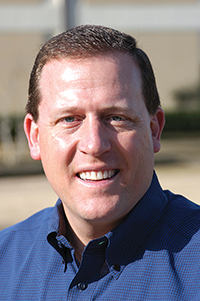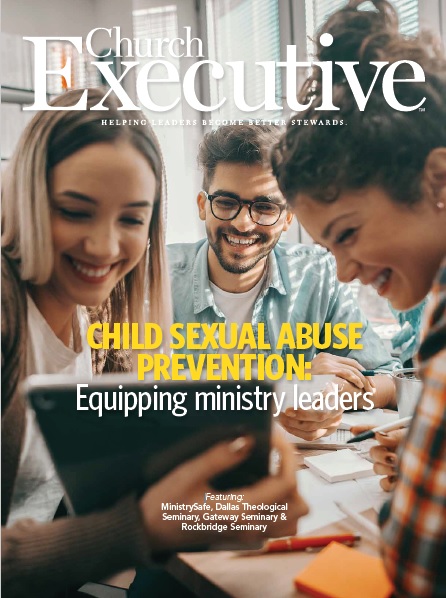Dallas Theological Seminary (DTS) has led the way on sexual abuse prevention training for more than two decades. Here’s a look at where it all started — and where it’s headed.

Department Chair & Professor of Educational Ministries and Leadership
Dallas Theological Seminary
DTS is lauded as “first in class” for its child sexual abuse risk prevention training, and you’ve played a big part. Tell me about that.
In 1999, I took over a long-standing course on legal and financial issues. In 2000, I added child sexual abuse risk as a topic, because our students need to pay attention to this if they’re going to be pastors in the local church.
Over the course of a 14-week semester, two of 28 class sessions were devoted to the topic. I invited a local youth minister to talk about what he experienced at two employer churches where occurrences happened. He was uniquely qualified to share what the churches did right, did wrong, and what they should be doing.
I also invited a private investigator to talk about sexual abuse registration requirements, background check nuances, and so on.
At what point did MinistrySafe become involved?
After a few years, someone suggested I connect with [MinistrySafe Co-Founder] Greg Love. I told him about what I was doing in my class, and he told me what he was doing professionally. Soon, he replaced my youth ministry speaker. For lack of a better term, he lit the students’ hair on fire. They didn’t realize how the church is asleep at the switch on this risk.
In many ways, I’ve also been running around with a lighter setting everybody’s hair on fire.
I invited Greg to speak at chapel, which is a pretty big deal at DTS. Students are required to attend, and speakers are generally a who’s-who of the evangelical world.
I believe it was [Seminary President] Dr. [Mark] Yarbrough’s first exposure to Greg; afterwards, he immediately moved towards having MinistrySafe implemented at his church and Christian school.

Dr. Darrell Bock was also there. He’s a professor here at DTS with worldwide influence and hosts a current issues podcast. He asked Greg and me to be guests.
Soon, we focused on what was next: the creation of a full-blown, three-credit-hour, master’s-level course.
Greg and Kimberlee [Norris, MinistrySafe Co-Founder] came to DTS and presented their material with our multiple-camera setup. This generated more than 18 hours of video, and the content was implemented into MinistrySafe Institute. Now, MinistrySafe Institute is the heart of our three-credit-hour master’s level course, which we’ve offered for four or five semesters, now.
What does your master’s-level sexual abuse prevention coursework entail?
The course is called “Prevention of Child Sexual Abuse” and was first offered in spring 2017. It’s the complete MinistrySafe Institute training.
There are two things that put the course over the top for students. The first is four two-hour live webinars during the semester with Greg and Kim, where students review study material and do a lot of case study work — real-life, real-case scenarios (presented generally, of course, for ethical reasons). Greg and Kim ask students to answer questions about those scenarios based on their training. Where is the church most vulnerable? What kind of an abuser would this person tend to be?
Second, as a final project, students create an effective safety system they can take back to their ministries. And many, many of their churches adopt MinistrySafe training. That’s a good thing.
Now, DTS also requires every student to complete sexual abuse awareness training. When did it become mandatory, and what do they learn?
About four years ago — parallel to all the efforts around the development of the master’s-level course — I pushed for mandatory training which required students to watch and pass a test related to the 70-minute “Sexual Abuse Awareness Training” video from MinistrySafe. At first, it was required around their third semester of study. Then, in spring 2019, Dr. George Hillman — Dean of Students at the time — made it mandatory during the first semester.
Because the training video can be triggering for some students, prior to watching it, we also require them to view a resource video which alerts them to the counseling department and other resources available to them from DTS, if needed.
I understand you’re even offering sexual abuse prevention training to DTS alumni?
Yes! We’re in the process of making MinistrySafe Institute access available to them.
Dr. Yarbrough has said, “Ministry leaders cannot address a risk that they don’t understand.” What are some common misconceptions (or gaps in awareness)?
First, my students need to accept the fact that this risk is real and widespread. In the church, we tend to trust. Some of that trust is misplaced based on naivete.
Also, abusers have no ‘visual profile’ — they look like you and me. As a result, the abuser is often not someone we would suspect. We cannot recognize this risk visually; we must recognize this risk behaviorally. ‘Stranger-Danger’ has very limited effectiveness.
Finally, when I have a conversation with a student or ministry leader, it is common to have that person assure me that the risk of sexual abuse is ‘under control’ at his or her church. When pressed as to how, it’s amazing how many ministry leaders depend exclusively on the criminal background check as a standalone solution to this problem. That’s a serious misconception, especially given some of the data related to the likelihood of the abuser having a criminal record: less than 10 percent. Churches need to do the background check, but not rely on the background check as the sole strategy for child protection.
With so much study and training happening online, has DTS adjusted its sexual abuse prevention training options?
Most of the sexual abuse curricula has historically been offered online.
We will continue to find opportunities for live instruction, but we will leverage all forms of delivery to meet this serious and growing challenge.
How do you envision DTS’s commitment to child sexual abuse prevention expanding or evolving?
MinistrySafe has the 70-minute “Sexual Abuse Awareness Training” video available with Spanish and with Chinese subtitles. We’ll be incorporating that into our requirements immediately so that our Spanish and Chinese students can have the same mandatory training that our English-speaking students are required to complete.
We are also working with MinistrySafe to make it available in German and Arabic.
— Reporting by RaeAnn Slaybaugh


